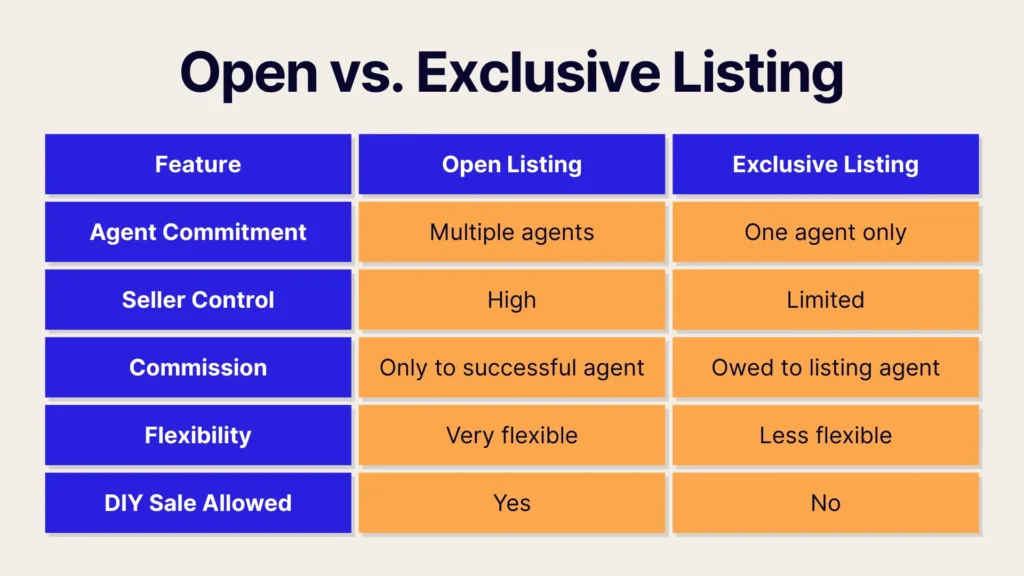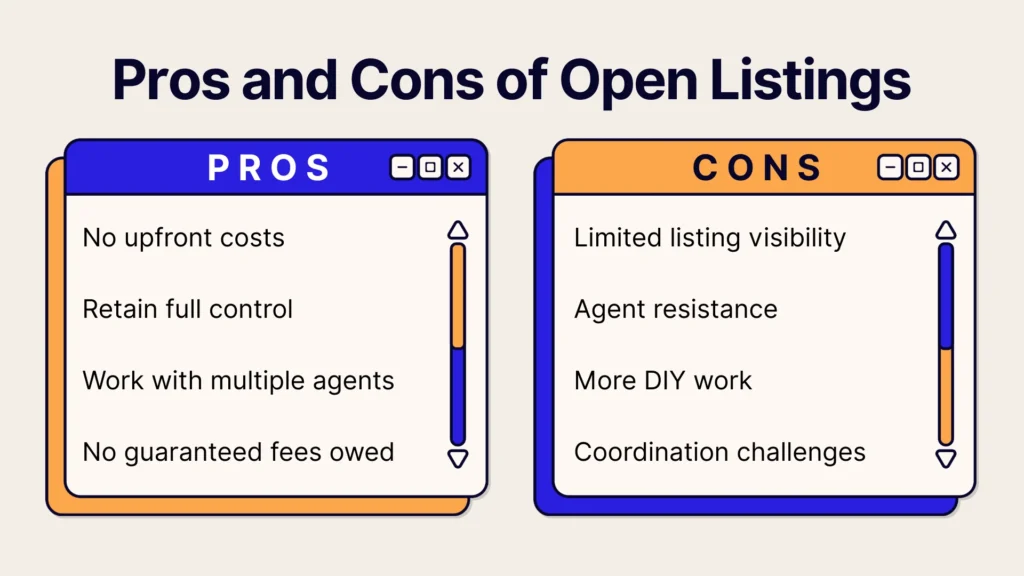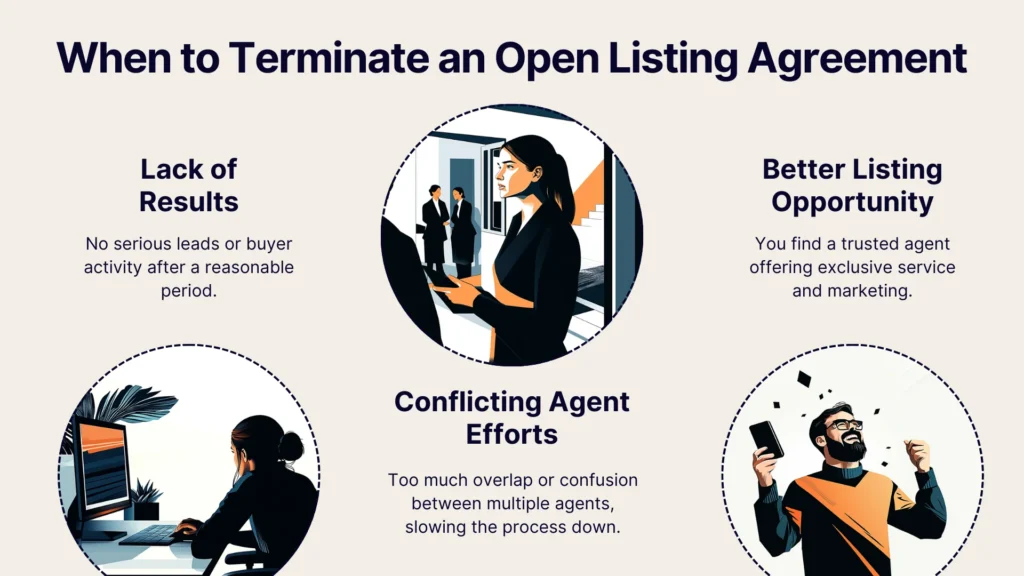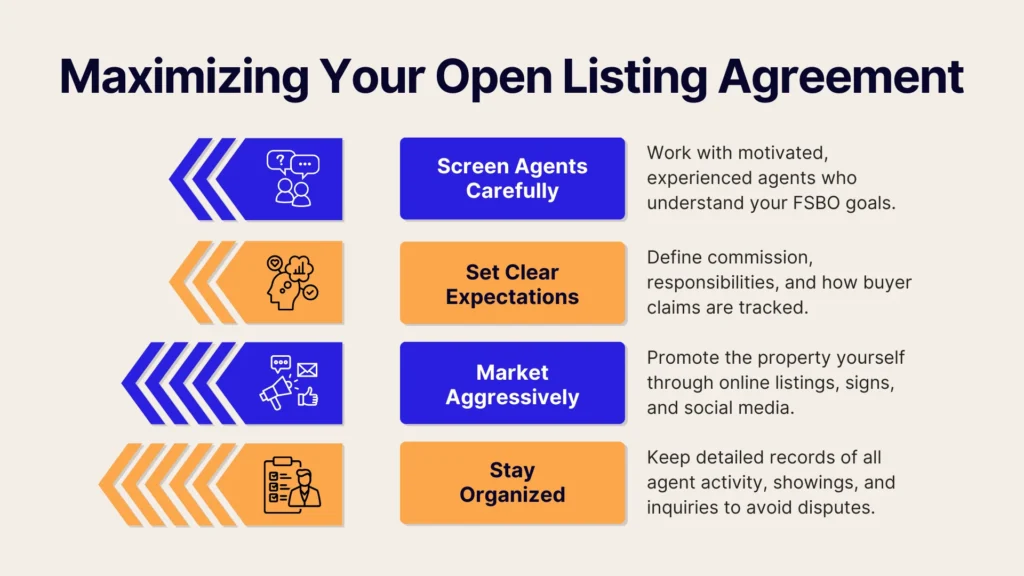Navigating your first home sale can feel overwhelming, especially when you're going the FSBO (For Sale by Owner) route. While it puts you in the driver’s seat, it also means making some important decisions on your own. One of the first? Choosing the right listing agreement.
If you’re looking for flexibility and want to keep control of the process, an open listing agreement might be the option that fits best.
In this article, we’ll walk you through what an open listing agreement is, how it works, and why it can be a smart move for FSBO and first-time sellers alike. We’ll also break down how it compares to an exclusive listing, so you can make a choice that aligns with your goals.
What Is an Open Listing Agreement?
An open listing agreement is a type of non-exclusive real estate contract between a home seller and one or more real estate agents. Unlike exclusive agreements, it allows the seller to work with multiple agents, or even sell the home themselves, without being locked into a single relationship. This setup gives sellers more flexibility and control, two things first-time and FSBO sellers usually want most.

The Basic Structure of an Open Listing
Here's how this type of agreement sets itself apart:
- No exclusive agent rights: You're not tied to just one agent. You can list your property with several agents or none at all.
- Flexibility for sellers: You maintain control and have the freedom to find a buyer on your own.
- Commission only to the agent who delivers: Only the agent who brings in the buyer earns the commission. If you find your own buyer, you don’t owe anyone a fee.
This approach is appealing to sellers who want to avoid long-term contracts or high commission fees, which also requires more active involvement.
Why Choose an Open Listing Agreement?
If you're an FSBO or first-time home seller, the open listing agreement might align perfectly with your goals of saving money and staying in control.
The typical FSBO home sold for $380,000, compared to $435,000 for agent-assisted sales. That’s a significant difference, and while some of it may reflect property type or location, avoiding full commissions is often a big factor. open listing agreements support this strategy by allowing you to only pay commission when it's earned.
So why do some sellers swear by open listings?
Benefits for Sellers
Let’s look at why some sellers love this flexible model:
- Lower commission costs: You only pay if an agent finds a buyer, and only that agent gets paid.
- Greater control: You're free to market and show your home however you choose.
- No long-term contracts: Open Listings are typically shorter and easier to terminate.
- More exposure: Multiple agents can help bring in buyers without locking you into one firm or strategy.
Potential Drawbacks for Sellers
Despite the perks, there are a few trade-offs to keep in mind:
- Less agent motivation: Since they’re not guaranteed commission, agents may not invest heavily in marketing your home.
- Minimal Marketing: You’ll need to take the lead on promoting your property.
- Coordination challenges: Working with multiple agents can create overlap, duplicate efforts, or disputes over who introduced a buyer.
Managing multiple agents can sometimes lead to conflicting strategies, but with clear communication, you can keep things organized and maximize your chances of success.
The Pros and Cons of Open Listing Agreements for FSBO Sellers
Open listings can offer big advantages, but they’re not without complexity. Here’s how the pros and cons stack up for FSBO sellers:

Pros for FSBO Sellers
Consider these positives if you're selling solo:
- No upfront costs: You can test the market without investing in a full-service agent.
- Retain autonomy: Manage your sale on your terms.
- Customizable exposure: Choose how many agents you work with and where you market the property.
Cons for FSBO Sellers
And here’s where things can get tricky:
- Limited visibility: Without a dedicated agent, your listing may not be promoted as widely.
- Agent resistance: Some agents may be hesitant to work under this model due to reduced incentives.
- More effort on your end: You’ll likely need to handle more logistics, follow-ups, and showings yourself.
How Open Listing Agreements Work in Practice
Curious how it all works? Here’s what the process typically looks like.
- Draft and sign the agreement: Outline terms, including the commission amount, duration, and property details.
- Work with multiple agents: Share your listing across various channels and agents.
- Market the property independently: Continue your marketing efforts to find buyers directly.
- Field offers: If an agent brings a buyer, they earn a commission. If you do, you save the fee.
- Close the sale: Proceed with negotiations, inspections, and final paperwork.
Understanding the logistics helps you manage expectations and responsibilities throughout the process.
Legal Considerations and Terms in Open Listing Agreements
Before entering an open listing agreement, it’s essential to understand all the terms, particularly around commission fees and cancellation. Make sure the commission structure is well-defined and aligns with your expectations. The right agreement can prevent confusion later and protect both you and the agents involved.
Understanding Commission Fees and Payment
The commission structure should be clearly defined in the agreement. Since the seller only pays the agent who brings the buyer, the agreement should specify the commission rate and the terms of payment.
Here’s how commission works under an Open Listing:
- Only paid if an agent finds the buyer: Typically a set percentage (e.g., 2.5%–3%).
- No commission if you find your own buyer: A major draw for FSBO sellers.
- Clarity is key: Make sure the agreement outlines exactly when and how the agent is compensated.
Terminating an Open Listing Agreement
If the seller decides to cancel the agreement before the property is sold, the terms of cancellation should be clearly outlined in the agreement. This could include any notice period or penalties for terminating the contract early.

Know your rights if you need to walk away or make changes:
- Easy to end: Most open listings can be terminated at will, especially if the property hasn’t sold.
- Watch out for the fine print: Some agreements may include clauses about “procuring cause” or short-term protections even after termination.
- Document everything: Keep written records of any changes or cancellations to avoid disputes.
Open Listing Agreements vs. Exclusive Listing Agreements
If you're confident in your ability to market your home and want to avoid paying commission unless absolutely necessary, an open listing is worth considering. If you prefer someone to handle everything and don’t mind paying for it, an exclusive listing may be a better fit.
Here’s a quick side-by-side comparison to help you see which one fits your situation best:
| Feature | Open Listing (Flexible) | Exclusive Listing (Full Service) |
| Agent Commitment | Low – works with multiple agents | High – one dedicated agent |
| Seller Flexibility | High – sell it yourself anytime | Low – restricted from solo selling |
| Marketing Effort | Light – self-led or limited | Full – agent-led marketing campaigns |
| Commission Required | Only if agent finds the buyer | Usually required no matter what |
| FSBO Friendly | Yes | No |
When choosing a listing agreement, it's essential to understand the key differences between an open listing and an exclusive listing.
In an exclusive listing agreement, one agent is exclusively responsible for selling the property. This means the seller is restricted from working with other agents or selling the home themselves without still owing a commission. While this agreement ensures a more dedicated effort from the agent, it comes with higher commission fees and limits the seller’s flexibility.
Conversely, an open listing allows the seller to collaborate with multiple agents or even sell the property on their own, providing more flexibility and lower commission costs. However, since there’s no guarantee that an agent will earn a commission, agents may be less motivated to market the home aggressively, and the marketing efforts can be limited.
Each option has its pros and cons, so the best choice depends on your needs—whether you prioritize flexibility or a more dedicated sales effort.
How to Maximize the Success of an Open Listing Agreement
An open listing agreement allows FSBO sellers to work with multiple agents who can expose the property to a broader audience, especially on popular third-party aggregators like Zillow, which 10% of FSBOs use to market their homes.

In 2024, FSBO sellers most commonly marketed their homes through friends or neighbors (18%), yard signs (12%), and third-party websites (10%). Combining these grassroots methods with agent outreach can broaden exposure without a full-service listing contract.
- Screen agents carefully: Work with those who understand and respect FSBO goals.
- Track interactions: Keep records of agent communications to avoid commission disputes.
- Set clear expectations: Make sure all agents know the terms and who gets paid and when.
Conclusion
For FSBO sellers, an open listing agreement offers flexibility by allowing you to work with multiple agents or sell the property yourself. However, managing the process can be overwhelming without the right tools.
Propbox simplifies the FSBO journey by automating key tasks, organizing your listing, and keeping you on track with timely reminders. Skip the 6% commission, maintain full control, and sell faster. Start your journey today with Propbox and experience a smarter, more efficient way to sell.
